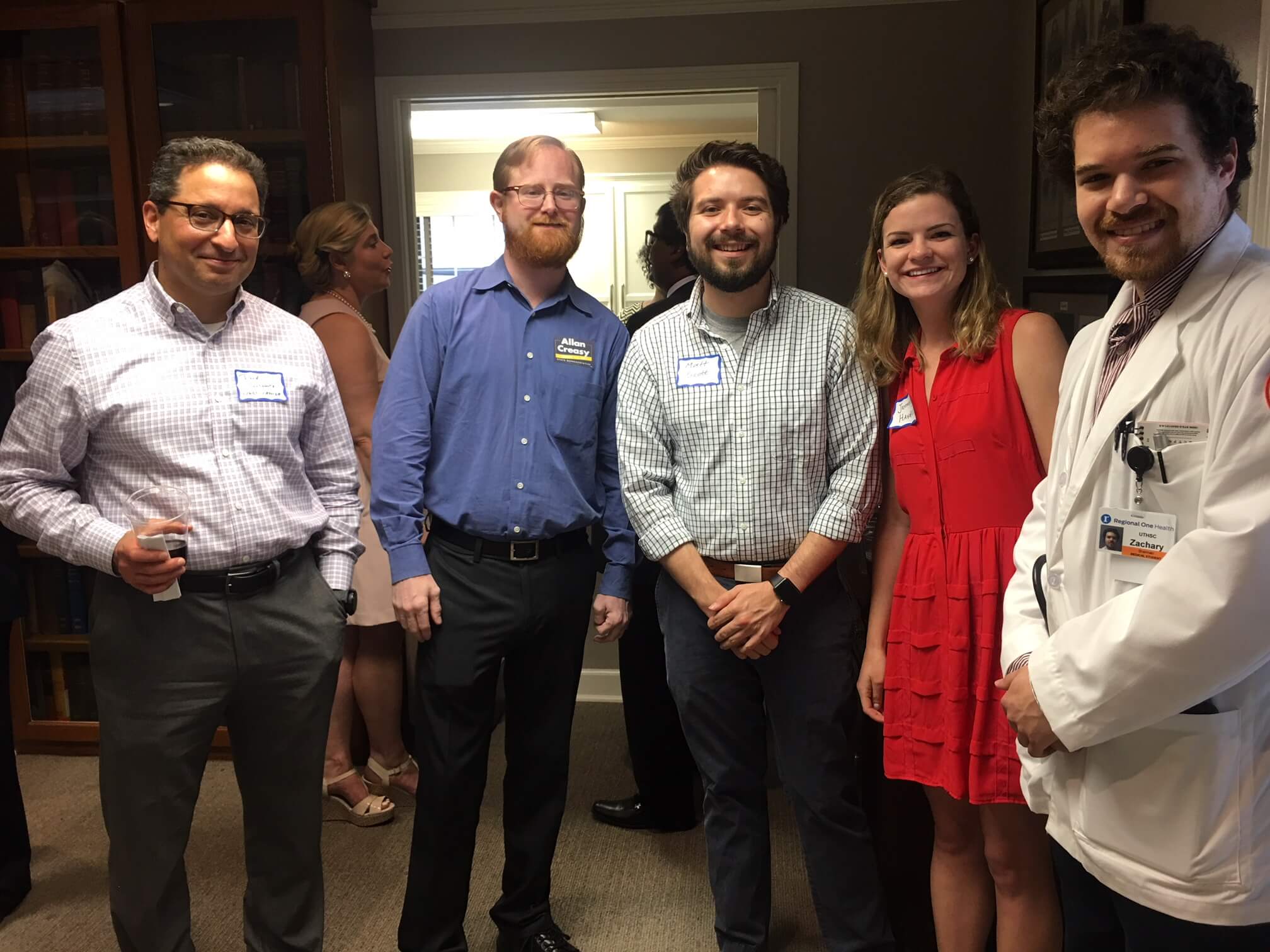Here are the answers to a questionnaire that The Memphis Medical Society sent to candidates running in local elections. These answers are what the candidates wanted to communicate to our membership.
MEET THE CANDIDATES EVENT, JUNE 27, 2018
Graduate Medical Education (Resident Physicians) Funding- Did you know that funding for residency slots for medical school graduates has not increased since 1997? If the state increases its funding, the Center for Medicare and Medicaid Services funds it at a 2-to-1 match? Just $8,000,000 additional in our state budget would generate $25 million to train new doctors in our state. What is your position on this issue?
Charlotte Bergmann (R) U. S. HOUSE – TN9: I will need to do additional research on this issue, in order to do a cost, benefits analysis and to determine unintended consequences for this funding.
Amber Huett-Garcia (D) Tennessee House of Representatives, District 86: We should fund the $8M to capitalize on the match.
Katrina Robinson (D) TN State Senate, District 33: I support funding for graduate medical education.
Gabby Salinas (D) State Senate District 31: Shelby County is a Healthcare driven city, we have some of the best training hospitals in the Nation. If we are going to remain competitive, we must increase our Graduate Medical Education Fund so that we do not continue to miss out on federal funding.
Jim Coley (R) 97th Legislative District: I sit on the Budget Subcommittee and I’ll vote for the match.
Torrey Harris (D) Tennessee House of Representatives, District 90: I believe in Education. It is required that residency be completed prior to practicing in Medicine. We have people who have dedicated themselves to complete Medical School however we do not have enough in place to fund the residency slots and it is something to definitely look into for the near future.
Brian Kelsey (R) State Senate District 31: I have had numerous meetings on this issue and am in favor of increasing the funding for graduate medical education.
Team-Based, Physician-Led Care – Groups representing nurse practitioners and physician assistants are seeking to achieve independent practice for their professions, meaning Medical Doctors will not sign off on 20% of charts and make a monthly onsite visit, which is the current law?
Charlotte Bergmann (R) U. S. HOUSE – TN9: I believe a doctor has a right to make decisions governing his/her practice. As competition is re-entered into the doctor -patient relationship, the market should govern whether this practice is acceptable.
Amber Huett-Garcia (D) Tennessee House of Representatives, District 86: It’s unclear what question is being asked here, but I would love to learn more about the medical society’s thoughts on both sides.
Katrina Robinson (D) TN State Senate, District 33: I believe that there should be medical oversight of new nurse practitioners. Physician Assistants should operate under the authority of a supervising physician.
Gabby Salinas (D) State Senate District 31: I support the current law.
Jim Coley (R) 97th Legislative District: I want team based, physician led healthcare.
Torrey Harris (D) Tennessee House of Representatives, District 90: I support teamwork in a health care setting. There are significant benefits of Physician-Led care with physicians and non-physician practitioners working together, and sharing decisions and information for the benefit of the patient. I believe that working together allows both to draw on the specific strengths of each team member. I believe that eliminating independent practice is not the best thing to do as there are situations where a convenience and affordability benefit could be effective, but clarity on what is reasonable could be discussed.
Brian Kelsey (R) State Senate District 31: I support the current law.
Keeping Malpractice Liability Stable – Tennessee currently has a cap on non-economic damages of $750,000. Frequently, interest groups emerge that want to modify the system by removing the cap and/or giving an administrative law judge with no medical background the authority to determine guilt. What is your position on malpractice liability?
Charlotte Bergmann (R) U. S. HOUSE – TN9: As a federal nominee, I think this decision is best left up to the General Assembly and the voters.
Amber Huett-Garcia (D) Tennessee House of Representatives, District 86: As someone who works with many surgeons in my board position of a patient organization, it’s my understanding that malpractice liability is a hinderance to providing care. I would support caps on malpractice as long as standards for care remained rigorous. Again, would love to discuss more.
Katrina Robinson (D) TN State Senate, District 33: I believe that malpractice liability should be regulated with a cap on non-economic damages. The process should require the input of a medical authority.
Gabby Salinas (D) State Senate District 31: I support keeping the current system.
Jim Coley (R) 97th Legislative District: I have been a proponent of the caps in the past and I will support them in the future. I was prime sponsor of tort reform.
Torrey Harris (D) Tennessee House of Representatives, District 90: Malpractice Liability is in place to protect medical providers and I believe that Malpractice Liability should be a level of protection within reason. If a sponge is left inside of a patient and the patient infected, if a surgery goes wrong at the honest fault of a doctor, if a life is lost because of a failure on the part of the medical provider a price tag cannot go on a Human Body. A judge with medical knowledge should be given authority to determine these situations. The rubric of how $750,000 is a fair cap would need to be better explained to me.
Brian Kelsey (R) State Senate District 31: I co-sponsored the law implementing the cap on non-economic damages, and I support keeping the current system in place or lowering the cap to $250,000.
Episodes of Care – our state’s Episodes of Care program is expanding rapidly and causing massive disruption in healthcare. Decisions about the state’s episodes of care payment model are continually made without physician agreement and in many cases with physician opposition. The Tennessee Health Care Innovation Initiative must be fixed in TennCare before any other programs move further. What is your position on this payment model?
Charlotte Bergmann (R) U. S. HOUSE – TN9: This is a State issue and should be left up to the General Assembly, the doctor and the voters
Amber Huett-Garcia (D) Tennessee House of Representatives, District 86: This question prompted me to read through the program. I understand the premise and intent, but would love to discuss what impact it’s having in practice. Is the program inherently bad or is the shift exacerbated by other legislative controlled issues? In short, I don’t have a strong position, but I do want to hear what the physicians impacted have to say.
Katrina Robinson (D) TN State Senate, District 33: As a healthcare provider, I am aware that clinical pathways and evidence-based guidelines are not cookie cutter and it is not possible for treatment outcomes to take the same direction on each individual patient. Factors that require physician input and individual patient baseline and outcomes must be taken into account in a fair payment model.
Gabby Salinas (D) State Senate District 31: I need to learn more about the subject, I am open to making modifications to TennCare
Jim Coley (R) 97th Legislative District: I’m for physicians determining episodes of care.
Torrey Harris (D) Tennessee House of Representatives, District 90: I believe that our legislators need to revisit this, but revisit it with the intention to keep the payment model and address the disruption to healthcare that may have been caused. Physician input should be taken into consideration when making decisions for the citizen of this state. The understanding of why physicians oppose this payment model needs to be clearly stated and reviewed.
Brian Kelsey (R) State Senate District 31: I support efforts to constrain Medicaid costs; however, such decisions must be made with physician agreement. I support the recent decision by TennCare to freeze the Episodes of Care program until it can be further evaluated and improved– or redesigned all together.
Medicaid Expansion – Knowing our state’s previous attempts at expanding Medicaid (Insure Tennessee) and the state’s recent passage of a work requirement: What would you like to see happen with our state’s Medicaid program going forward?
Charlotte Bergmann (R) U. S. HOUSE – TN9: This program did not pass after multiple attempts in the General Assembly.
Amber Huett-Garcia (D) Tennessee House of Representatives, District 86: We should expand Medicaid. We paid those tax dollars and we should bring them back to TN. Instead of work requirements, I’d prefer we think of the intent of the social safety programs to help transition people to keep jobs. Often working kicks people who have the ability to care for their own needs if they had transition time.
Katrina Robinson (D) TN State Senate, District 33: Tennessee MUST expands Medicaid!
Gabby Salinas (D) State Senate District 31: Healthcare is the biggest line item in the state budget. I support Medicaid expansion; TN should take every opportunity to draw federal money to our state budget. Work requirements shouldn’t drastically change the number of people currently receiving Medicaid because most TN Medicaid recipients would be exempt under the same law.
Jim Coley (R) 97th Legislative District: I’m unsure at this point and I seek guidance from medical professionals. I understand that the work element will not be cost effective.
Torrey Harris (D) Tennessee House of Representatives, District 90: Medicaid needs to be expanded, period. I work in the field of HIV/AIDS Social Services and I see clients who need our assistance. I know of an individual paying $800.00 a day for her medication. I know many people struggling to afford expenses of their health. I would like to see State Legislature say they care about people enough to do what is right for them.
Brian Kelsey (R) State Senate District 31: I would like to see any savings that occur from the work requirement to be reinvested in the Medicaid program.
Other Thoughts You’d Like to Share Healthcare or Otherwise?
Charlotte Bergmann (R) U. S. HOUSE – TN9: I look forward to sharing with your group many of the alternatives to the current healthcare plan, which are being considered at the Federal level.
Amber Huett-Garcia (D) Tennessee House of Representatives, District 86: I am active patient advocate for the disease of obesity. I’ve served on the board of the Obesity Action Coalition for the last seven years. I currently have the support for the American Society of Metabolic Surgeons and I’m interested in taking discriminatory insurance policies that block access to care
Katrina Robinson (D) TN State Senate, District 33: I am a healthcare professional with experience working with physicians, nurse practitioners, PAs and ancillary health professionals. I understand the mechanics of an effective healthcare system, a fair and reasonable payment model, and challenges to healthcare access both from a facility perspective and a patient perspective. I plan to champion fair, equitable, and reasonable legislation that improves these outcomes.
Jim Coley (R) 97th Legislative District: I’m open to your guidance as professionals.
Torrey Harris (D) Tennessee House of Representatives, District 90: I am in definitely for Healthcare that is in the best interest of the patients. The patients live in Tennessee. The patients work in Memphis. The patients are priority and Healthcare is a freedom given to all people who live in this nation. I believe that Medicaid needs to be expanded. I believe people, working class people, all people deserve fair and equal healthcare to meet the needs of their everyday lives. I will work hard to ensure that people receive the honest treatment they deserve.
Brian Kelsey (R) State Senate District 31: I have been a champion of Memphis Medical Society issues for years, and I very much hope to receive your endorsement and support. Thank you for the opportunity to meet with you.







